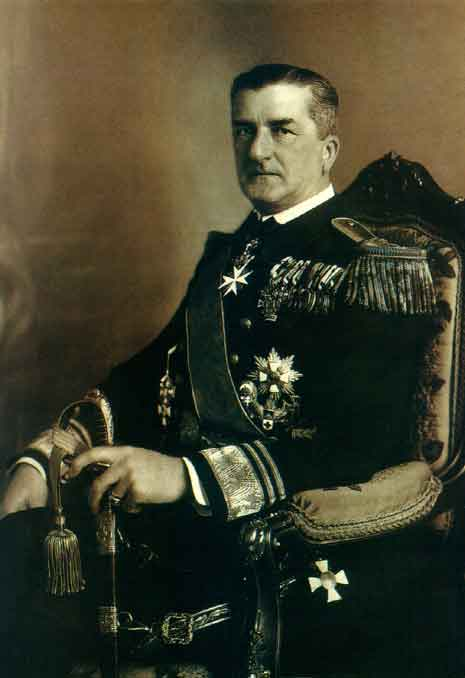Torq
4 Jul 2009 / #1
More Than Just a Common Border
After the Greman invasion of Poland in 1939 from the West, North and South
(from Czech and Slovakian territory) on the 1st of September 1939, and then
the Soviet aggression from the East on September 17th, the Polish-Hungarian
border became a blessing for many Poles.
In those hard days, Hungarians have proven once again that there was more
than just a common border that connects Poles and Hungarians.
Many times from early spring until September 1939, Hungarians let the Germans
know that they cannot count on them to take part in any kind of operation
against Poland.
In his speech from 27th April 1939, answering the German demands for military acces,
Hungarian foreign affairs minister - count István Csáky said:
"Whoever shall cross the Hungarian border without our consent will be considered
our enemy (...) If Germans try to do it, it will lead to a disaster. Common sympathy
between Polish and Hunagrian nations have with centuries turned into an alliance,
alliance that is not written on the paper but very much real and valid".
One Minute Was Enough

Admiral Miklós Horthy, regent of Hungary, not minding the consequences refused
Hitler the military access before the nazi invasion of Poland.
Just before the 1st of September 1939, Germany demanded the military access through
Hungarian territory for the troops to be transported for the attack on Poland.
The Hungarian Council of State under the leadership of regent Miklós Horthy needed
just one minute of session to answer unanimously "NO!".
Germans Try to Bribe and Then to Threaten Hungarians
Nazis, surprised by the Hungarian refusal, offered Hungary a part of Polish territory
in the Sambor area and when that failed they send a harsh diplomatic note from
the foreign affairs minister Joachim von Ribbentrop threatening Hungarians with
consequences if they refuse.
However, the Prime Minister of Hungary - Pál Teleki, said that:
"From the Hungarian point of view, it is a matter of national honour
not to take part in any kind of military action against Poland".
Pal Teleki
Count Pál Teleki, prime minister of the Kingdom of Hungary government.
After the fall of Poland, 140-150 thousand Polish refugees found shelter
in Hungary, together with many Polish organisations which had full freedom
of activity and support of Hungarian government (in spite of Hungary being
officialy an ally of the Third Reich).
Those noble deeds of Hungarians were a continuation of the 1000 years of brothership
between Hungarian and Polish nations, which started in the times of first royal families
of Piasts and Arpads.
Éljen Magyarország!
Long live Hungary! Long live Polish-Hungarian friendship!
"Lengyel, magyar - két jó barát, együtt harcol, s issza borát."
"Polak, Węgier, dwa bratanki, i do szabli, i do szklanki."
Read more about it in:
Grzegorz £ubczyk "Henryk Sławik - zapomniany bohater trzech narodów",
Oficyna Wydawnicza Rytm, Warszawa 2008
After the Greman invasion of Poland in 1939 from the West, North and South
(from Czech and Slovakian territory) on the 1st of September 1939, and then
the Soviet aggression from the East on September 17th, the Polish-Hungarian
border became a blessing for many Poles.
In those hard days, Hungarians have proven once again that there was more
than just a common border that connects Poles and Hungarians.
Many times from early spring until September 1939, Hungarians let the Germans
know that they cannot count on them to take part in any kind of operation
against Poland.
In his speech from 27th April 1939, answering the German demands for military acces,
Hungarian foreign affairs minister - count István Csáky said:
"Whoever shall cross the Hungarian border without our consent will be considered
our enemy (...) If Germans try to do it, it will lead to a disaster. Common sympathy
between Polish and Hunagrian nations have with centuries turned into an alliance,
alliance that is not written on the paper but very much real and valid".
One Minute Was Enough

Admiral Miklós Horthy, regent of Hungary, not minding the consequences refused
Hitler the military access before the nazi invasion of Poland.
Just before the 1st of September 1939, Germany demanded the military access through
Hungarian territory for the troops to be transported for the attack on Poland.
The Hungarian Council of State under the leadership of regent Miklós Horthy needed
just one minute of session to answer unanimously "NO!".
Germans Try to Bribe and Then to Threaten Hungarians
Nazis, surprised by the Hungarian refusal, offered Hungary a part of Polish territory
in the Sambor area and when that failed they send a harsh diplomatic note from
the foreign affairs minister Joachim von Ribbentrop threatening Hungarians with
consequences if they refuse.
However, the Prime Minister of Hungary - Pál Teleki, said that:
"From the Hungarian point of view, it is a matter of national honour
not to take part in any kind of military action against Poland".
Pal Teleki
Count Pál Teleki, prime minister of the Kingdom of Hungary government.
After the fall of Poland, 140-150 thousand Polish refugees found shelter
in Hungary, together with many Polish organisations which had full freedom
of activity and support of Hungarian government (in spite of Hungary being
officialy an ally of the Third Reich).
Those noble deeds of Hungarians were a continuation of the 1000 years of brothership
between Hungarian and Polish nations, which started in the times of first royal families
of Piasts and Arpads.
Éljen Magyarország!
Long live Hungary! Long live Polish-Hungarian friendship!
"Lengyel, magyar - két jó barát, együtt harcol, s issza borát."
"Polak, Węgier, dwa bratanki, i do szabli, i do szklanki."
Read more about it in:
Grzegorz £ubczyk "Henryk Sławik - zapomniany bohater trzech narodów",
Oficyna Wydawnicza Rytm, Warszawa 2008
 PolishForums LIVE / Archives [3]
PolishForums LIVE / Archives [3]